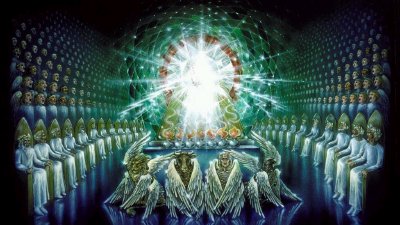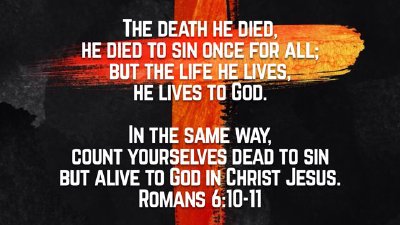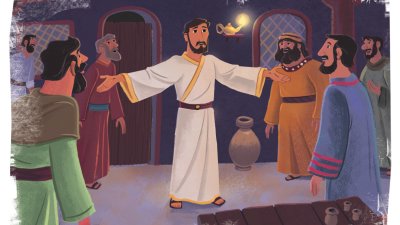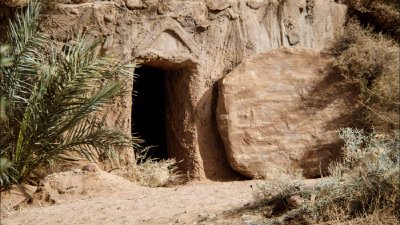


April 18-22, 2022
Reflections from Easter


The Only One Worthy
April 22, 2022 • Ed Green • Revelation 4—5
Over the years I’ve had the opportunity to see the inside of a palace in England, the Capitol in Washington, and both the old and “new” state capital buildings in Illinois. They were all beautiful and exuded a kind of power in their own right. But nothing like this… In Revelation 4 and 5 we read as John paints a picture of the heavenly throne room. Chapter 4 is a description of the throne, and the One seated upon it, and all the others present: the four heavenly creatures and the twenty-four elders. We hear the words of the songs they sing and the worship they give to God. And as we turn to chapter 5, we discover that God holds in his right hand a scroll sealed with seven seals. And a voice is heard crying out: “Who is worthy to open the scroll and break its seals?” (5:2). But no one in heaven or earth is found worthy. And John (the visionary) begins to weep… “And one of the elders said to me, “Weep no more; behold, the Lion of the tribe of Judah, the Root of David, has conquered, so that he can open the scroll and its seven seals.” And between the throne and the four living creatures and among the elders I saw a Lamb standing, as though it had been slain, with seven horns and with seven eyes, which are the seven spirits of God sent out into all the earth. And he went and took the scroll from the right hand of him who was seated on the throne. And when he had taken the scroll, the four living creatures and the twenty-four elders fell down before the Lamb, each holding a harp, and golden bowls full of incense, which are the prayers of the saints. And they sang a new song…” (5:5-9 ESV). If you haven’t heard Andrew Peterson’s song, “Is He Worthy?” do yourself a favor and take a few moments and listen to it. The Lamb (Jesus, the Messiah) who had been slain is alive and is worthy of all honor and glory and praise! That is what we celebrate every Easter, every Sunday, and every moment of every day, world without end.


Death AND Resurrection
April 21, 2022 • Ed Green • Romans 6:1–11
Here’s a question for you: What good is a dead Messiah? And another: Can you have all that God accomplished through Jesus’ death without his resurrection? We sometimes make the mistake of focusing primarily on one or the other. Generally, most Christians tend to emphasize the crucifixion more than the resurrection. We think about the forgiveness, the atonement, the blood that covers our sins. And rightly so. But in so doing, perhaps we do demonstrate a lack of reflection on the significance of the resurrection. So today, I invite you to read this passage from one of the apostle Paul’s letters. There are several others in the New Testament, but if you have time, stop now, and read Romans 6:1-11. Reflect on these questions: (1) What does baptism signify, according to Paul? (2) Because Jesus died, what does that mean for us? (3) What hope do we have because of his resurrection? (4) Practically, how does the death and resurrection of Jesus correlate to our own lives in Christ?


The Lowest Common Denominator
April 20, 2022 • Ed Green • Acts 25:13–25
About forty years ago I was really good with math. In middle school I learned algebra. In high school, advanced algebra, geometry, trig, and calculus. But those days are long gone. I traded in formulas, proofs, and derivatives for more important and practical matters (to me, at least). When it comes to fractions do you remember the concept of the lowest common denominator (LCD)? It is the smallest multiple of the denominators in a set of fractions—what is common among them all. Most of us don’t use the phrase for math anymore, but in life. It is sometimes meant in a derogatory way (focusing on the “lowest,” or “least”), but neutrally it simply means that among several issues or questions, it is what is most basic among them (focusing on the “common”). As the good news of Jesus spread and the Church grew, the whole movement also grew in complexity. What began in the backwaters of Palestine (places like Nazareth, Capernaum, and Jerusalem) began to reach the very heart of power (places like Caesarea, Athens, and Rome). The last several chapters of Acts recount how the apostle Paul ends up in the capital of Rome. On that journey he is arrested, and he is put on trial or interrogated multiple times. One of those instances was when the Roman governor Festus was trying to figure out just what to do with Paul, who had, as a Roman citizen, appealed his case to the emperor. He needed to know what to write in the report he would send along with Paul. This is how he described the situation to Jewish King Agrippa: instead of being about some evil, or breaking Roman law, “[the Jewish leaders] had certain points of dispute with him about their own religion and about a certain Jesus, who was dead, but whom Paul asserted to be alive” (Acts 25:19). If you boil Christianity down to its LCD, it is this: We believe that the man Jesus of Nazareth—who was dead—is alive. There is a whole lot more to it, but at its heart, this is what it is about, And that changes everything.


Surprise!
April 19, 2022 • Ed Green • Matthew 16:13–23
Have you ever been surprised with a birthday party? I’m typically hard to surprise and catch off guard, but Sally was able to pull it off once. There are almost always clues to what is going to happen, but because most of us are so busy (or just not very observant!), we miss them. They shouldn’t have been surprised. Jesus told them on multiple occasions, both that he would be killed in Jerusalem and that he would be raised. Consistently his disciples heard (and pushed back on) the first part, but downright missed the second and more important part. Take Peter in Matthew 16 for instance. Jesus had asked his disciples who they thought he was, and Peter confessed his (and their) belief that he was the Messiah, God’s son (16:13-20). Jesus then went on and began to show them about his upcoming execution, and that he would be raised on the third day. And Peter rebuked Jesus for saying such a thing! (16:21-23). Even Jesus’ closest friends could not fathom the dying of the Messiah, so they missed hearing the truth of his resurrection. Their ears and their minds were shut. So, when Jesus was arrested, they truly did not know what to do, and they scattered in fear. When Jesus showed up in their midst in the upper room on the third day after he was crucified and laid in a tomb, he could have just as easily yelled, “Surprise!” Imagine the shock, the tears, the joy, the questions: “How could we have missed it?”


He is not here!
April 18, 2022 • Ed Green • Matthew 28
Many years ago, my wife’s grandfather passed away and we traveled to her hometown in Indiana to be with our family. At the visitation the evening before the funeral, I was standing off to the side when I overheard our young nephew ask the funeral director this question: “Is he the only dead guy here?” I don’t remember his response, but I must be honest, it was hard not to break out laughing. After Jesus’ lifeless body was taken down from the cross, a disciple named Joseph from the village of Arimathea, and the teacher Nicodemus, took it and prepared it as they had time and laid in his own new tomb. No body had ever been buried in that tomb. On the first day of the week following Jesus’ execution, a few followers of Jesus—all women— headed to tomb with spices in hand, to anoint his body. On their way, they were discussing who would move the stone from the front of the tomb, but when they arrived, it had already been rolled up and out of the way. They were met by an angel who told them not to be afraid, and then gave them this message: “He is not here, for he has risen, as he said” (Matthew 28:6). For the last 2000 years or so, the fact of the empty tomb has served as a witness to the reality of the resurrection of Jesus from the dead. As Peter would later say, even David’s tomb was there with them, but not the tomb of Jesus (Acts 2:29). Stories were concocted (see Matthew 28:11-15) and theories suggested, even in our own day. But none can adequately explain this truth: the tomb was empty. There was not even one dead guy there. He is alive.
